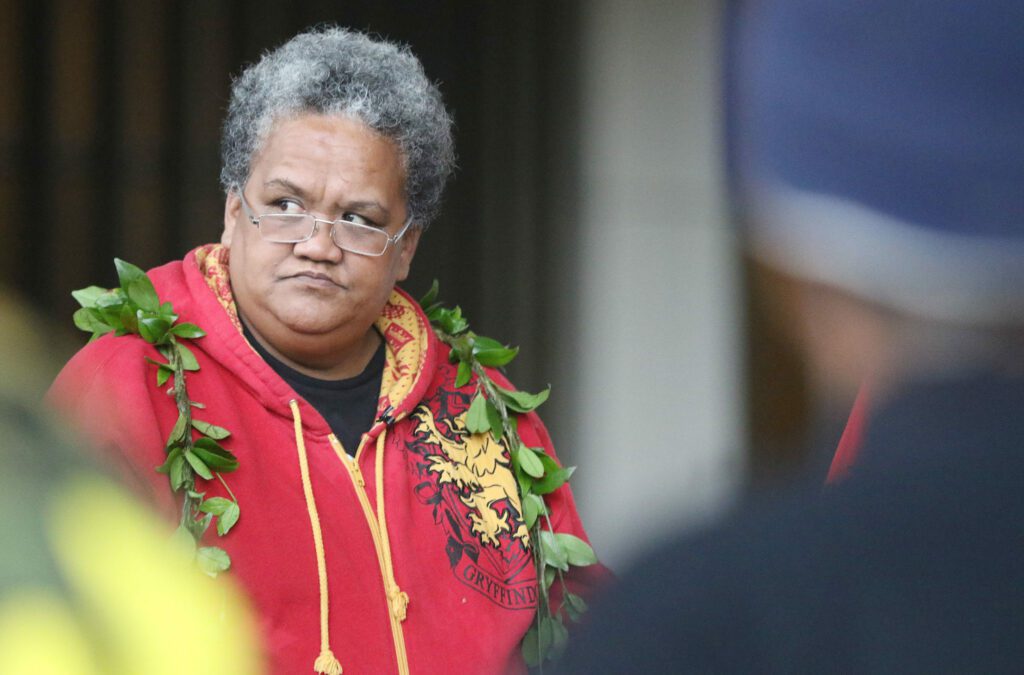Six years ago, Twinkle Borge was engaged in a desperate fight to save her community, when she heard a disturbing rumor: One of the people involved in the efforts to sweep the Waianae Boat Harbor encampment was dealing with severe depression and anxiety over the situation.
Twinkle was dealing with her own anxiety as she tried to demonstrate why the cobbled-together refuge of last resort that she shepherded should be left alone. But she wasn’t going to stand by and let someone else suffer. Not even someone whose actions she was fighting with every ounce of strength she had. She quickly arranged a meeting and told them to put down their emotional load.
“Don’t ever think it’s a personal thing,” Twinkle recalled saying. They had their job to do and she had hers.
But her community was also a resource if they needed it. “If you fucking need us to be there, we can help you,” she said.
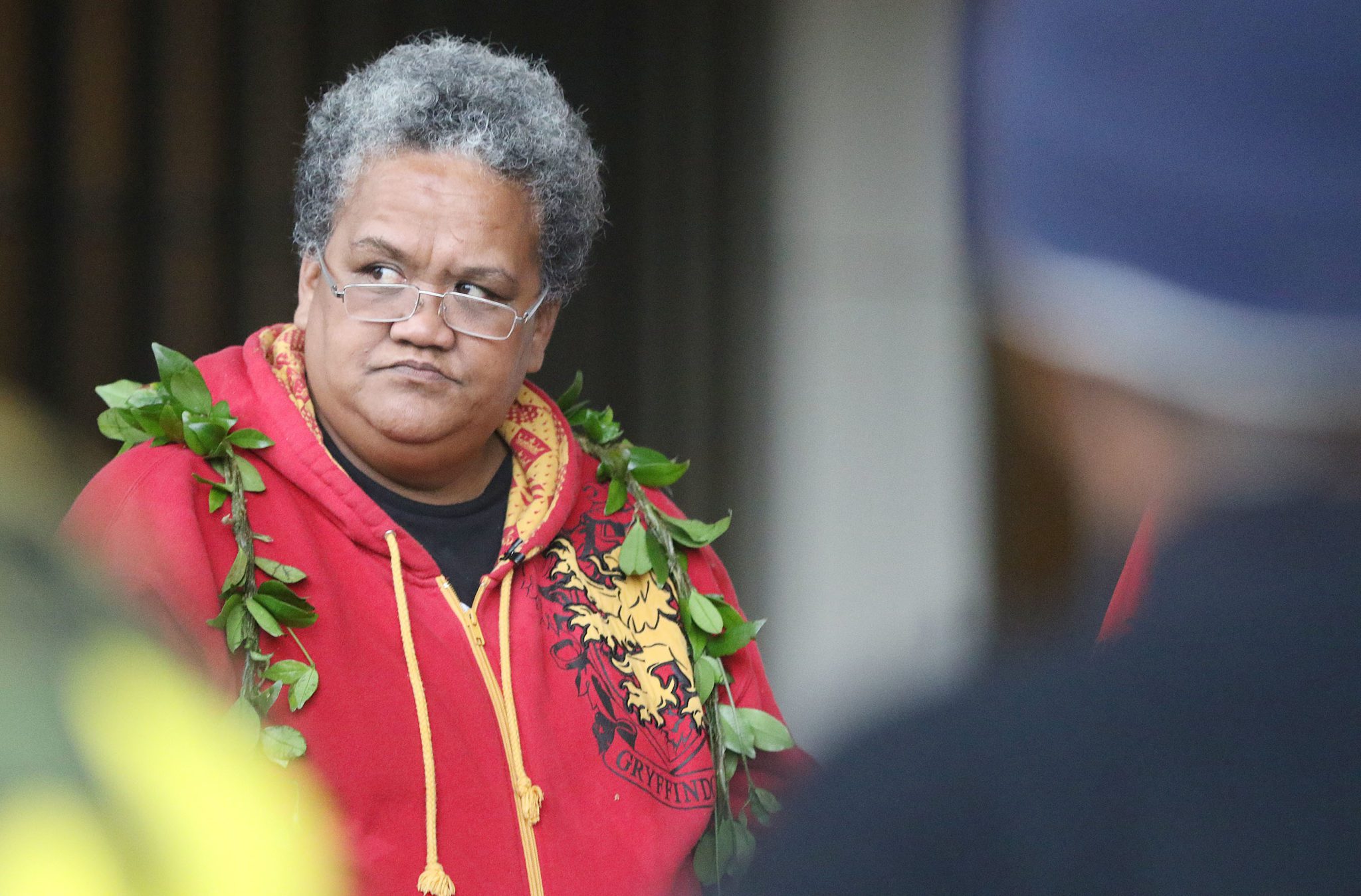
 Twinkle Borge at a press conference at the State Capitol in 2018, part of a successful effort to avert a sweep of the community by the Waianae Boat Harbor. (Cory Lum/Civil Beat/2018)
Twinkle Borge at a press conference at the State Capitol in 2018, part of a successful effort to avert a sweep of the community by the Waianae Boat Harbor. (Cory Lum/Civil Beat/2018)
Twinkle told me that story three years ago, as we sat under a pop-pup tent on the mostly vacant agricultural land she had recently moved to — an early step in her efforts to build a permanent village for people long pushed to the fringes of society. It was an anecdote I never included in an article about her efforts, but one that stayed with me because it spoke to what was so remarkable about Twinkle: Her ability to see the humanity in everyone. To disapprove of someone’s actions and still value them as a person.
The 54-year-old homeless advocate, who died in August, had one of the warmest and strongest embraces of anyone I’ve ever met. And I mean embrace in every sense of the word. In the way she wrapped her arms around friends and strangers alike, and the way she so fully embraced people with all of their flaws.
Today, people from all across Hawaii will gather in Waianae for a memorial service on what would have been her 55th birthday. Her family will be there. So will the governor. Native Hawaiian activists. A U.S. congresswoman. Flags across Hawaii have been flying at half-staff for days — a remarkable tribute to a humble woman who just a decade ago had laughingly pointed out that she couldn’t pick then-Gov. David Ige out of a lineup.
The public tributes are nice, though they will likely do little to ease the pain of her family and friends or fill the void of leadership her death has left.
Waianae, the community she dedicated much of her life to, is hurting. There are nearly twice as many people living on the streets of Oahu as there were a decade ago. Even middle-class people in Hawaii are struggling to survive. The Westside is dealing with a wave of violent crime — including a fatal shooting in the boat harbor adjacent to the Waianae encampment the day after her death. People across the state and the nation are increasingly divided politically and isolated socially.
Twinkle showed Hawaii that a different way forward is possible — if we have the courage to radically rethink not only how we treat one another, but how we view each other too.
Creating A Sense Of Belonging
I met Twinkle in the summer of 2015, when I spent several months at the Boat Harbor encampment, now known as Puuhonua O Waianae, in an effort to tell a different kind of story about homelessness in Hawaii.
In the years since, Twinkle became one of the most prominent homeless advocates in Hawaii. I don’t need to regurgitate the story of how she came to lead the self-governed homeless community in Waianae or how that community became the inspiration for the state’s kauhale or tiny home movement (whether the state’s concept of a kauhale is in any way similar to what Twinkle created is a subject for another time.)
What I will say is that Puuhonua O Waianae was, and by all accounts still is, a special place. And it is special because Twinkle and the tough-as-nails women who helped her keep order in the camp, created a community more tight-knit than anything I experienced living in an apartment complex or a suburban neighborhood in town.
People spent time together. They helped each other daily, in acts big and small. They knew the details of each other’s lives intimately — in part because their safety depended on it.
I don’t want to paint too rosy of a picture of the camp. A decade ago, at least, it was a sometimes dirty and scary place, where people went off their medication and slept among piles of trash and feces. It was a place where people who loved the land created a home for themselves, and others lived in a hell of their own making.
But it was clear that Twinkle believed everyone — unless they were a danger to others — deserved a place there to call home. That everyone, no matter how terrible their life choices were, had value and potential.
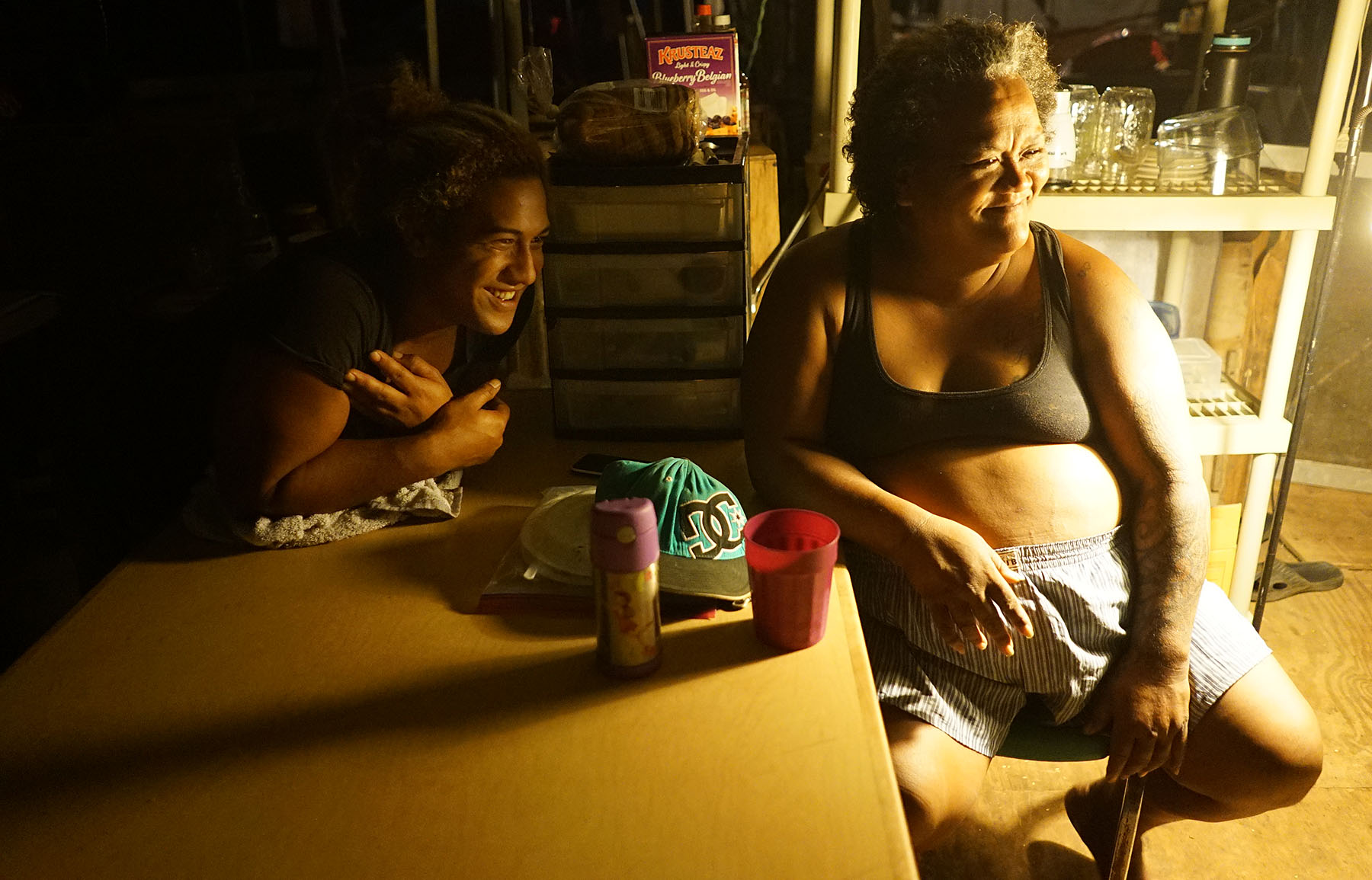
 Twinkle Borge in 2015 with Adam Luafalemana-Fuiava, one of the many teens in the harbor who had come to call her “Mom.” (Cory Lum/Civil Beat/2015)
Twinkle Borge in 2015 with Adam Luafalemana-Fuiava, one of the many teens in the harbor who had come to call her “Mom.” (Cory Lum/Civil Beat/2015)
Twinkle was a no-nonsense woman who wasn’t afraid to tell people exactly what was up. She had a temper, she said, that at times scared her own father — though the only time I saw her truly enraged was when she was chasing down someone who had beaten his partner in the camp.
But she rarely talked about people just in the context of their flaws. She talked about how they reminded her of someone special to her. About her dreams for them to live a better life, to be a better parent, to have a roof with a kitchen table where they could sit down with their children at night and share a meal.
She had a deep love for the people in her community, and in extending that love she offered people a deep sense of belonging. A gift that somehow extended even to me, a haole journalist from the mainland who didn’t know what “da kine” meant and had only spent a few months on the island. Every time I came to visit, Twinkle embraced me. You, too, have a place here, was the message that came across.
Recognizing The Potential In Us All
The last time I really got to spend any quality time with Twinkle was in 2021, shortly before I left Oahu for a yearlong fellowship on the mainland. We spent time talking about my infant daughter, and hers. About all the kids in the harbor who she’d helped raise over the years and how they were doing.
She’d developed a closer connection to Hawaiian sovereignty movements and her own cultural heritage in recent years, but she said her focus was on the now. Yes, she’d love to speak Olelo Hawaii, but a bigger priority was learning sign language so she could communicate with one of the kids in the Puuhonua who was hearing-impaired.
As always, her mind was constantly reflecting on what her community needed. And her ambitions were getting bigger by the year. She still couldn’t quite believe that the nonprofit she helped found had managed to buy a 20-acre plot of land to build a permanent village.
But her focus was no longer just on how to build a new community from scratch — a monumental undertaking in and of itself — but also what she could do to help the people struggling around her move to “the next level.”
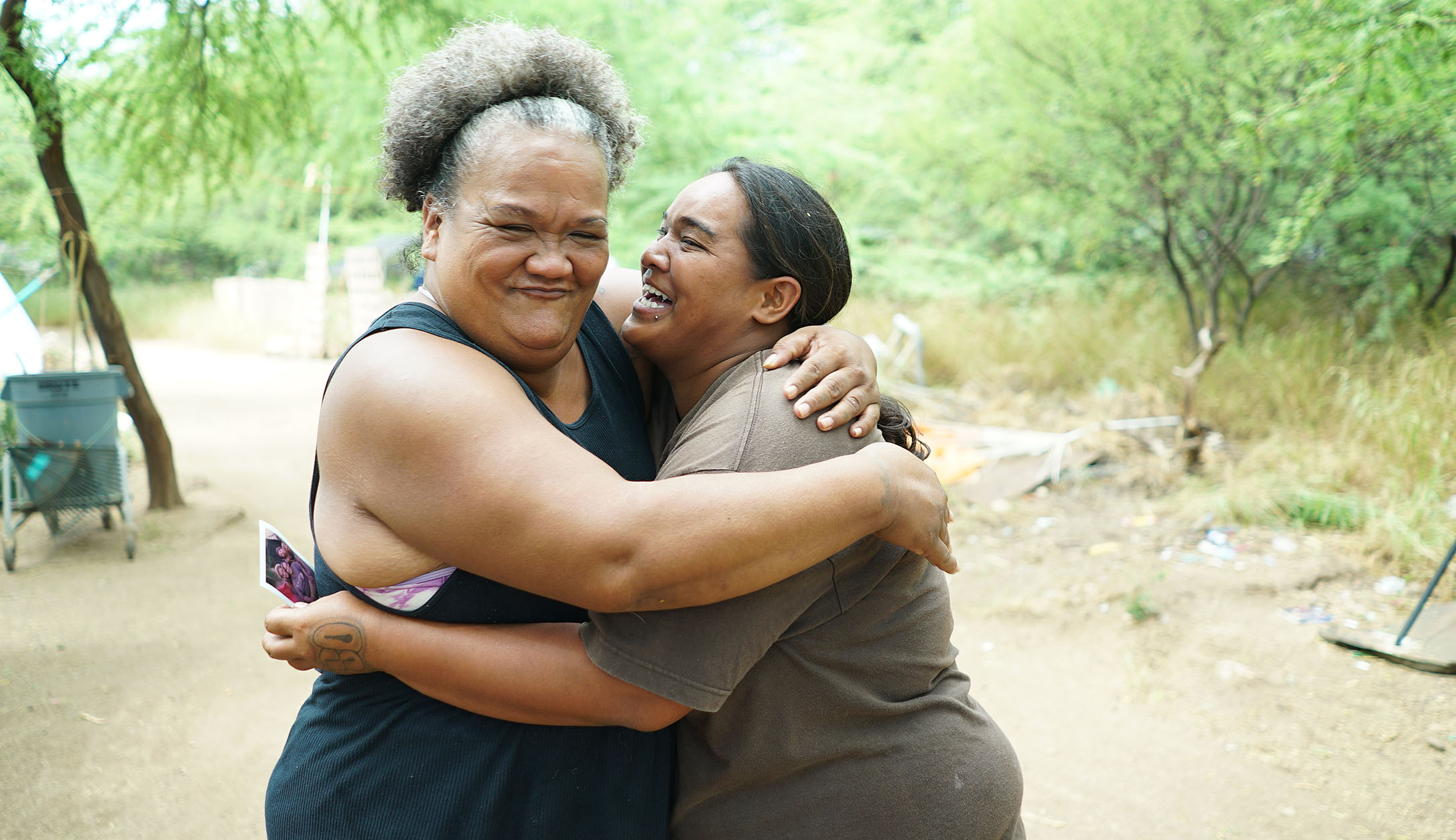
 Twinkle in 2015 with Tamra, one of the many young people she took under her wing. (Cory Lum/Civil Beat/2015)
Twinkle in 2015 with Tamra, one of the many young people she took under her wing. (Cory Lum/Civil Beat/2015)
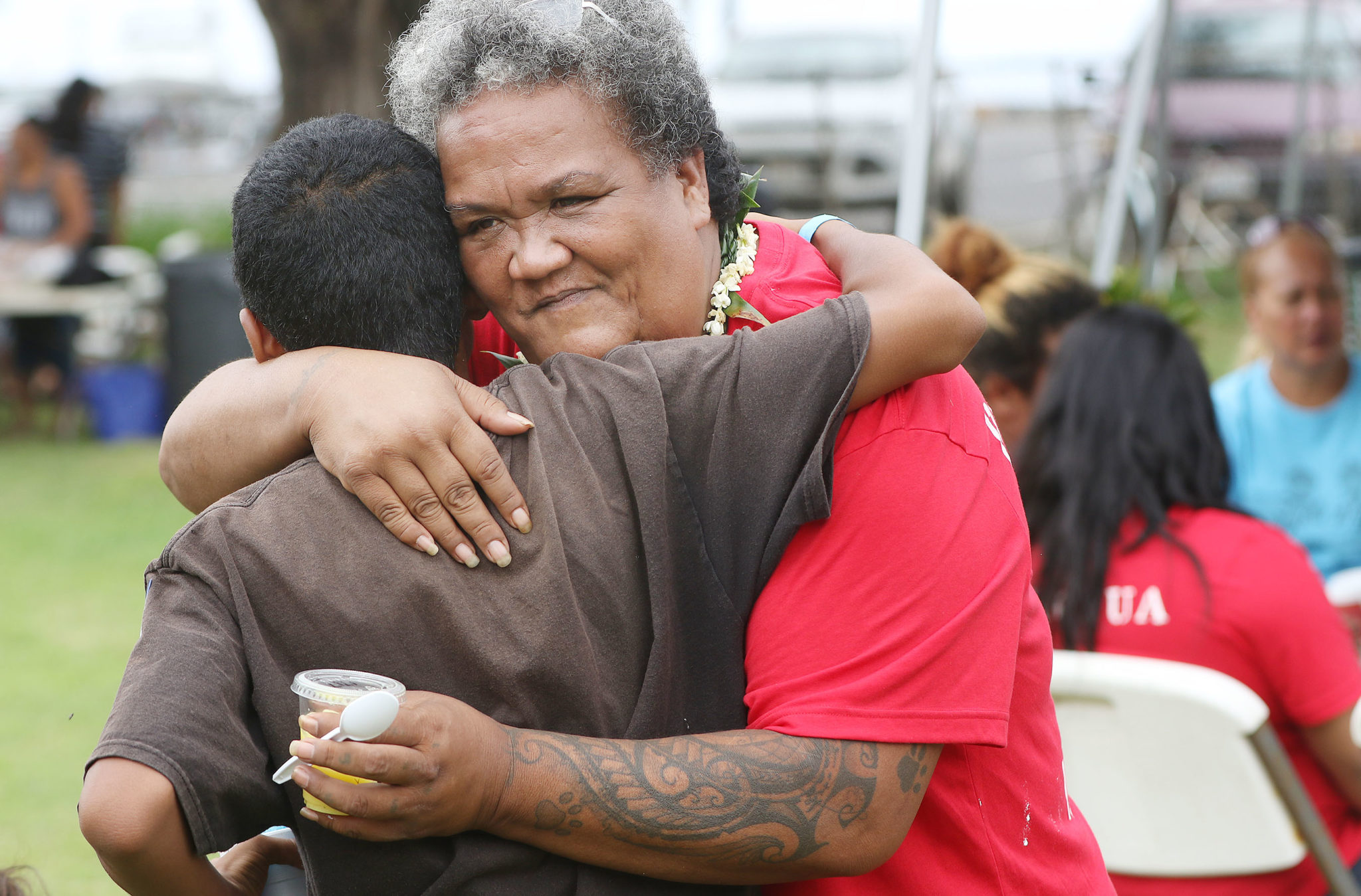
 Twinkle receives a hug during an open at Puuhonua O Waianae in 2018, the year she managed to stave off the threat of a sweep and received a groundswell of support for a permanent village. (Cory Lum/Civil Beat/2018)
Twinkle receives a hug during an open at Puuhonua O Waianae in 2018, the year she managed to stave off the threat of a sweep and received a groundswell of support for a permanent village. (Cory Lum/Civil Beat/2018)
She’d come to the realization that people needed to work on themselves first, that they needed help addressing their own trauma and demons if any bigger community changes were going to happen.
“We got a fix you before can fix any other thing in your pathway, which is your kids, your family or anything,” Twinkle said. “We got to do you first.”
It was her hope that when she called everyone home, when people living at the encampment were in a permanent place at the village, they would start feeling better about themselves. They might want to improve their lives. Get clean.
Stories and tributes to Twinkle since her passing have often spoken of how she embodied aloha, that sacred and yet often poorly defined — and frequently co-opted — Hawaiian value.
I suspect some people will take it to mean that she was kind. Welcoming. Full of love. And she was all of those things. But she was also fierce. Determined. Committed. Unwavering in her dedication to doing something about the suffering around her.
There will be an inclination in the years to come to put her on even more of a pedestal than she already is — we already see it in the language of some of the tributes on social media.
She was someone worthy of sainthood. The Mother Teresa of Waianae. A leader unseen since the Hawaiian royals of old.
She is worthy of many tributes, but to elevate her as somehow above or different from the community she served would be a disservice to her and her legacy. Twinkle was a remarkable woman and a remarkable leader, but a part of what made her so extraordinary was her ability to recognize the potential in everyone.
To understand that people don’t have to have a house to be a part of a community. That homeless people can be leaders. That people in the throes of addiction, people who have made terrible mistakes and fallen from grace, still have something of value to contribute in this world.
There are future Twinkles all around us. And there is the potential for us to all make Hawaii a better place by looking at the people around us with deep and radical compassion the way she did.

Sign up for our FREE morning newsletter and face each day more informed.
Sign Up
Sorry. That’s an invalid e-mail.
Thanks! We’ll send you a confirmation e-mail shortly.
Source link : http://www.bing.com/news/apiclick.aspx?ref=FexRss&aid=&tid=66e6c673108a47128c61789ea6ed386e&url=https%3A%2F%2Fwww.civilbeat.org%2F2024%2F09%2Fthe-mother-teresa-of-hawaii-had-an-important-lesson-for-us-all%2F&c=2709549610321267163&mkt=en-us
Author :
Publish date : 2024-09-14 23:01:00
Copyright for syndicated content belongs to the linked Source.
